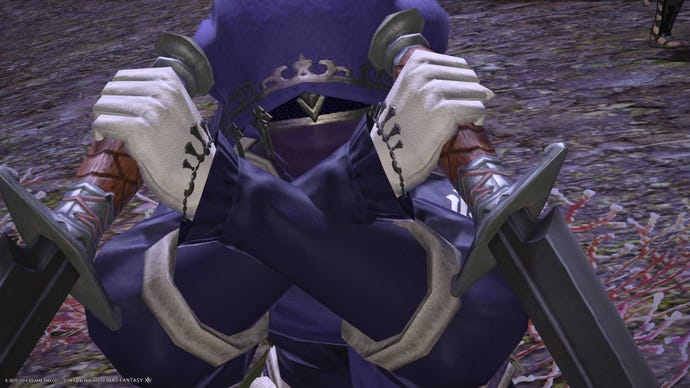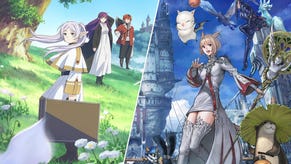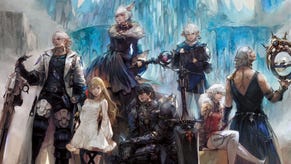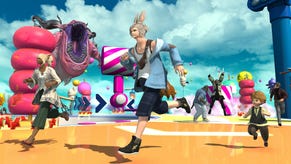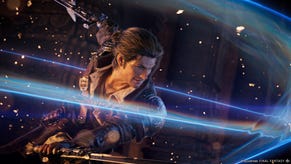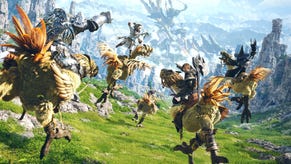A Realm Reborn: The third evolution of Final Fantasy
Final Fantasy 11. Final Fantasy 14. And now Final Fantasy 14: A Realm Reborn - a whole new game, despite the shared title. We spoke to director Naoki Yoshida about the third MMORPG from Square Enix's most famous franchise.
If you Google "Final Fantasy 14 sucks" you get no shortage of results. This is precisely what I did before going to meet Naoki Yoshida, the man responsible for Final Fantasy 14: A Realm Reborn - a game which shares a name and a setting with its precursor but nothing else. I printed out the search results page linked above, and I handed it to him. I watched his face as translator Saori Spencer Hill explained that almost everything on the page was an angry assault on the game.
Yoshida's forehead wrinkled a bit and he pointed out that the first result dated from August 2010. I grinned and handed over a second page, which differed in just one way: I'd changed the search period to the last month. Whereas the outpouring of hatred for Square Enix's second attempt at an MMORPG was once near universal, not a single result on the recent page was a complaint about the game.
Again, I watched Yoshida's face as this was explained, and was rewarded by seeing his professional reserve crack. A smile slowly took over his features and he ducked his head a little, pleased. "I'm really happy," was his only comment.
"Traditionally you had to have your beer ready, your snacks ready, your keyboard and mouse – and then switch on the game and play the game for hours."
This was kind of a mean stunt to pull on a man's birthday but I wanted to demonstrate to Yoshida that we are aware of what he's achieved. Final Fantasy 14: A Realm Reborn is an incredible turnaround for the game and the franchise. Square Enix's investment of significant resources in an entire rebuild of an established MMORPG was an incredibly gutsy gamble, but its trust in just one man to helm the entire project, overturning the publisher's established hierarchies and processes to do so, was flat out astonishing.
It paid off. During a media presentation prior to my interview, Yoshida said that with 2 million players worldwide Final Fantasy 14 is now the most successful MMO ever to come out of Japan.
I know what you're thinking - what other MMOs originate in Japan? Well, and that's fair enough, because while there are quite a few not many of them have any kind of mainstream recognition. There is one though - Final Fantasy 11, the first MMORPG from Square Enix, and before you pooh-pooh that let me remind you that FF11 is the most profitable Final Fantasy game to date.
Those are big shoes to fill, and FF11 is still going strong even now. No doubt Square Enix would like that to continue, and it seems a bit odd that it's running two MMORPGs at the same time; you might expect there to be some cannibalisation. But Yoshida says the two fanbases are quite different.
"Final Fantasy 11 I consider a first generation MMO, like EverQuest, so it was a really tough gaming experience. The drop rate was really low. You really had to have a very, very strong community in order to play the game.
"It's been over 11 years since Final Fantasy 11, so for Final Fantasy 14 we really made sure it was suitable for the current lifecycle. I think the community itself is quite different," he said.
That old school MMO still has its fans, of course, but as Yoshida talks it's clear that although he knows and loves that generation of games he had a different kind of experience in mind with FF14.
"It was our intention to make it different for having so much grind," Yoshida said. "Traditionally you had to have your beer ready, your snacks ready, your keyboard and mouse - and then switch on the game and play the game [for hours].
"But nowadays you have so many devices you can just pick up and play straight away - like smartphones - so players these days need to see rewards straight away, of the time they spend in the game.
"Even just one hour, two hours a day - they want feedback about whatever they've done straight away."
Yoshida said levelling is the "tutorial" of MMORPGs, and the real game starts after that, when players start exploring different kinds of content. As such, he didn't want players to grid away for a week to go up one measly level.
"It's easy to level up, but there's so many different classes or jobs to try out," he added. That players can switch between jobs whenever they like means there's a lot of replayability as they try different roles without restriction - including the restriction of levelling. As of a recent patch, there are very rare rewards for players who want that old school experience and put the time into it; but for everyone else, the ease of access to content is revolutionary.
There's one other way FF14 really differs from other MMORPGs out there - it's the first available on PlayStation 4. Not that this has gone down especially well with PC gamers; searching around for the rare complaints about FF14 before the interview, one of the only bits of negativity I could find was a reference to game performance - in terms of lag and drop-outs - increasing when PS4 players come on board.
I joked with Yoshida that PC gamers whinge longer and louder than any other kind; he laughed but politely declined to agree. Nevertheless, he strongly rebutted the suggestion.
"There's absolutely no truth to that. There's no data showing that," he said. He acknowledged the PC game did suffer a little around the time the PS4 version came online - but that was down to a buggy update, he said, not anything to do with the console servers. "And we fixed that within five days," he added.
During the media presentation before my interview, Yoshida answered a number of FAQs journalists always throw at him. His favourite FF games are FF3 and FF7, and his favourite class or job is black mage.
With this in mind I couldn't help but ask him who his favourite character was in FF7, because the materia system is so flexible that none of the characters is necessarily a black mage. "Sephiroth," Yoshida answered. I think we're kindred souls.
But the director had a more serious answer, and one that communicated to me very clearly something Yoshida has indicated time and time again: he's a huge Final Fantasy fanboy, and he thinks about the franchise very seriously.
The thing is, he explained, FF3 and FF7 are both really important games to the series as a whole. With FF3, Yoshida believes Square Enix (then Squaresoft, of course) nailed down the job system for the first time; while it wasn't used in every subsequent game, it set a precedent for Square to focus on satisfying RPG mechanics.
FF7, on the other hand, was the first time a Final Fantasy game had players closely follow the story of a character; Cloud's journey is at the heart of FF7 in a way the ensemble casts of previous titles didn't allow. Again, some later titles followed this style and others didn't, but it's an important turning point.
A Realm Reborn, Yoshida said, is a third moment of evolution for the franchise, in that it focuses on the player's own story in a way no other Final Fantasy game - including FF11 - has managed so far.
How fitting for what is, thanks to the game's entire rebuild, the third MMORPG the franchise has produced.



























